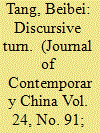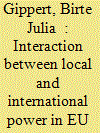| Srl | Item |
| 1 |
ID:
144553


|
|
|
|
|
| Summary/Abstract |
This article writes the agrarian history of an obscure locality, Cuttack, in early-nineteenth-century British India. In doing so, instead of exalting the explanatory power of the local, or the particular, it interrogates the category of the ‘local’ itself by demonstrating how it was assembled as the object of agrarian governance in British India through a densely interwoven network of discursive practices. I present this network as various inter-regional practices and debates over agrarian governance in British India and some methodological debates of political economy in contemporary Britain. This article argues that the governmental engagement with locally specific, indigenous forms of interrelationship between landed property and political power in British India can be more productively understood as internal to the transformed vocabulary of contemporary political economy, rather than lying outside it, amid the pragmatism and contingency of governance. Accordingly, it shows how the particularity of agrarian relations in a locality was produced out of a host of reconfigurations, over different moments and sites, of a universal classificatory grid. In the process, I question those histories of British India which, being rooted in a series of hierarchized binary oppositions, like inside–outside, abstract–concrete, or universal–particular, reproduce the rationality of colonial governance.
|
|
|
|
|
|
|
|
|
|
|
|
|
|
|
|
| 2 |
ID:
137368


|
|
|
|
|
| Summary/Abstract |
This article examines local governance and citizen participation in China through unstructured public deliberation. Case studies from two urbanized villages show that unstructured, informal public deliberation potentially leads to more autonomy and diverse channels for pursuing citizens' appeals at the local level, along with increased consideration given by local government to grassroots requests relating to practical governance matters. Although taking place outside formal political institutions, unstructured public deliberation can exert influences on policy or decision-making inside government organizations through well-coordinated transmission mechanisms between the public and the local government. During this process, well-resourced community organizations and actors play a vital role through their bridging functions to produce dynamic relations of deliberative governance. This bridging role serves to deliver deliberative outcomes from the public sphere to the decision-making authorities, and it also includes the collection of feedback on policy as well as the means to negotiate for policy adjustment by facilitating a policy implementation process.
|
|
|
|
|
|
|
|
|
|
|
|
|
|
|
|
| 3 |
ID:
157979


|
|
|
|
|
| Summary/Abstract |
This article explores the interaction between local and international power structures in EU peacebuilding. While citizens in a state only face order from one authority (the state), local actors in a peacebuilding context are subject to orders from two institutions (the domestic state and the peacebuilding mission). This article explores the nature of interactions of these two institutions and their effect on local police officers’ compliance and resistance. Specifically, it analyzes the example of the police restructuring process in Bosnia and Herzegovina. It demonstrates that the choices of local officers to comply or resist depended on whether the interactions between the EU Police Mission and the local police organization were positive and mutually supportive, or whether they were competitive and contradictory. The findings of the article contribute to the debates on the role of local power and the importance of local legitimacy in peacebuilding.
|
|
|
|
|
|
|
|
|
|
|
|
|
|
|
|